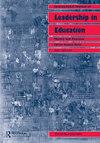教师对教学领导运用的看法与经验:来自历史教师的证据
IF 2.5
Q1 EDUCATION & EDUCATIONAL RESEARCH
International Journal of Leadership in Education
Pub Date : 2023-11-06
DOI:10.1080/13603124.2023.2274362
引用次数: 0
摘要
摘要本研究以中学历史教师为样本,探讨他们对教学领导的看法与经验。我们采用混合方法,分别涉及200名和13名受访者,用于定量和定性数据链。数据收集采用调查问卷和焦点小组讨论方案两种工具。研究结果显示,中学教师的教学领导经验是有限的。尽管领导经验不足,但在中学实践的教学领导中,定期召开学生绩效会议的比例最高。本研究的结果强调了领导力在正式和非正式领导者(包括教师)之间的分布,以维持学校目标和使命的实现。我们的结论是,教学领导的实践应该扩展到其他关键的利益相关者,特别是历史教师。该研究通过主张学校领导和教师之间的合作,使学校目标和使命的实现更容易,从而为学术做出了贡献。该研究还提出了一个灵活的领导框架,以满足感兴趣的研究地点特有的当地条件。本文来源于C. Musandu未发表的博士论文。在同行评审之后,详细信息将在这里被捕获。披露声明作者未报告潜在的利益冲突。其他信息:贡献者说明。MusanduCosmas Musandu是一位拥有超过13年教学经验的大学讲师。他于2019年在南非布隆方丹的自由州大学获得课程研究(历史教育)博士学位。在此之前,他获得了Hillside Teachers ' College的教育文凭,后来从津巴布韦大学(University of Zimbabwe)毕业,获得教育学士学位。2001年,他获得了津巴布韦大学的图书奖,并于2010年以优异成绩获得该大学的教育学硕士学位。他在卢彭州立大学获得监测与评估特别荣誉学士学位(一等),并于2022年获得该大学社会科学硕士学位。他参加过国内和国内的会议。C. JitaLoyiso Jita是南非布隆方丹自由州大学(RSA)教育学院科学、数学和技术教育系主任兼SANRAL主席。他拥有美国密歇根州立大学(MSU)课程研究、科学教学和教育政策研究多学科博士学位。主要研究方向为:教师变革、课堂改革、科学与数学教育教与学的教学领导。a. BadaAbiodun Adekunle Bada是尼日利亚翁多州翁多阿德耶米教育学院课程与教学系高级讲师。他拥有Obafemi Awolowo大学,Adeyemi教育学院,尼日利亚,Ondo的科学教育(物理学)学士学位。他在尼日利亚伊洛林大学获得教育硕士(科学教育)和哲学博士(科学教育)。他目前是南非布隆方丹自由州大学教育学院博士后研究员。本文章由计算机程序翻译,如有差异,请以英文原文为准。
Teachers’ opinion and experiences of the application of instructional leadership: evidence from history teachers
ABSTRACTIn this study, we sought from a sample of secondary school history teachers their opinions and experiences of instructional leadership. We adopt the mixed methods approach that involved 200 and 13 respondents each, for the quantitative and qualitative strands of data, respectively. Two instruments (survey questionnaire and focus group discussion protocol) were used for data collection. The results indicate a limit to the instructional leadership experienced by teachers in secondary schools. Despite the inadequacy in the leadership experienced, regular meetings on students’ performance were reported highest among the instructional leadership practiced in secondary schools. Findings from this study emphasized the distribution of leadership among formal and informal leaders, which include the teachers, to sustain the achievement of school goals and mission. We conclude that the practice of instructional leadership should be extended to other crucial stakeholders, especially history teachers. The study contributes to scholarship by arguing for collaboration between school leaders and teachers to make the achievement of school goals and mission easier. The study also argues for a flexible leadership framework that meets the local condition(s) peculiar to the research site of interest. AcknowledgmentsThis article is generated from an unpublished doctoral thesis of C. Musandu. The details will be captured here after peer review.Disclosure statementNo potential conflict of interest was reported by the author(s).Additional informationNotes on contributorsC. MusanduCosmas Musandu is a College Lecturer with over 13 years teaching experience. He bagged his Doctorate Degree in Curriculum Studies (History Education), from the University of the Free State, Bloemfontein, South Africa, in the year 2019. Prior to this, he obtained a Diploma in Education from Hillside Teachers’ College and later graduated from the University of Zimbabwe with a Bachelor of Education Degree. He won a book prize from the University of Zimbabwe in 2001 and proceeded to attain a Master of Education Degree with merit, from the same university in 2010. He obtained another Bachelor of Science Special Honours Degree in Monitoring and Evaluation (first class) from Lupane State University, and a Master of Social Science Degree from the same university in 2022. He has attended conferences both nationally and internally.L. C. JitaLoyiso Jita is the Dean and SANRAL Chair in Science, Mathematics and Technology Education, Faculty of Education, University of the Free State, Bloemfontein (RSA), South Africa. He holds a multi-disciplinary PhD in Curriculum Studies, Science Teaching, and Education Policy Studies from Michigan State University (MSU) in the USA. His research interest are teacher change, classroom reform and instructional leadership for the improvement of teaching and learning in science and mathematics education.A. A. BadaAbiodun Adekunle Bada is a Senior Lecturer in the Department of Curriculum and Instruction, Adeyemi College of Education, Ondo, Ondo State, Nigeria. He holds Bachelor of Science Education (Physics) from Obafemi Awolowo University, Adeyemi College of Education Ondo, Nigeria. He bagged his Master of Education (Science Education) and Doctor of Philosophy (Science Education) from the University of Ilorin, Nigeria. He is currently a Postdoctoral Fellow in the Faculty of Education, University of the Free State, Bloemfontein (RSA), South Africa.
求助全文
通过发布文献求助,成功后即可免费获取论文全文。
去求助
来源期刊

International Journal of Leadership in Education
EDUCATION & EDUCATIONAL RESEARCH-
CiteScore
5.10
自引率
14.30%
发文量
65
期刊介绍:
International Journal of Leadership in Education: Theory & Practice is an international journal for the publication of theoretical and practical discussions of educational leadership. The Journal presents: •cutting-edge writing on educational leadership, including instructional supervision, curriculum and teaching development, staff development, educational administration and more; •an alternative voice: reports of alternative theoretical perspectives, alternative methodologies, and alternative experiences of leadership; •a broad definition of leadership, including teachers-as-leaders, shared governance, site-based decision making, and community-school collaborations.
 求助内容:
求助内容: 应助结果提醒方式:
应助结果提醒方式:


